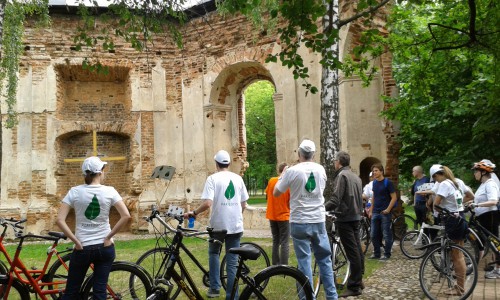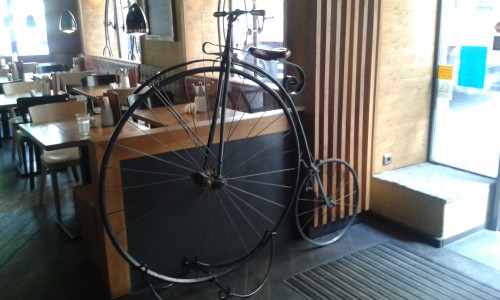26th June 2015
On yer bike
Two weeks ago I found myself cycling in a part of Minsk I hadn’t visited before. I was in Loshitsa Park cycling along the cycle lanes and listening to a guide describe the park’s varied history.
I was one of many taking part in an event about climate change organised by my colleagues in the French embassy. It was “European Climate Diplomacy Day”, and my French colleagues were organising the event as Paris will be the venue for the next conference on climate change in December this year.
I hadn’t realised that similar events were happening all over Europe. (That’s sometimes the problem with our work in that we cover so many issues that we can’t keep track of everything.) Scanning various digital media, I saw that European diplomatic missions were holding joint events in other countries as well.
The issue of climate change is becoming more urgent. The levels of carbon dioxide in the atmosphere are at their highest levels. Rainfall patterns are changing with more storms and extreme weather. Sea levels are rising. The levels of snow covering are decreasing. If you are sceptical about climate change, just click here and read on.
We need an agreement in Paris on what to do to limit the increase in global temperatures. But all of us can make a difference. We can all do something to limit our impact on the environment. And cycling is one of the best ways. As a mode of transport it is particularly beneficial for three main reasons.
First and foremost, cycling is a much cleaner option than using a car that burns fuel and emits gases, including carbon dioxide. In Britain, transport is the second largest source of carbon dioxide emissions after power stations and other forms of mass power generation. But the levels of emissions are falling – and they would fall even more if more people took to their bikes.
London has witnessed great growth in the number of cyclists. According to the Office of National Statistics, the number of people who cycled to work doubled between 2001 and 2011, to over 100,000. The number of cyclists has risen markedly because of the introduction of a bicycle hire system all over the city, similar to one introduced in Paris. But the numbers could be much higher.
Secondly, the increase of cycling has calmed cities through a reduction in traffic noise and congestion on the roads. Some London streets are now much quieter and more pleasant places to visit. That’s not to say cycling is a safe form of transport. There are accidents between cyclists and pedestrians, but in most cases such collisions don’t result in deaths, unlike accidents involving cars.
Sadly, there has been an increase in the numbers of cyclists killed in road accidents. In response, cycling groups have lobbied the authorities in London to set aside more space on the roads for cyclists.
Thirdly, there is the major advantage of cycling as exercise. It is good for our personal health to take exercise, particularly for people like me who spend time sitting behind desks in offices.
I’ve noticed many more cyclists in Minsk this year – there were far fewer when I first arrived three years ago. Cycling isn’t just in fashion in Minsk. It’s increasingly popular in Britain, and from what I can see, all over Europe. I’d like to think that many more people are cycling because they want to reduce carbon emissions. But maybe they are doing it for their health and personal enjoyment.
Readers of this blog know I tend to focus on explaining Britain and focus on British matters. I would very much like to say that cycling is a British invention. In fact, the development of the bicycle can’t be attributed to any one person or nation.
The machine that became known as the bicycle, developed in various steps all over Europe in the late nineteenth century. I saw this example recently of one of the most distinctive of the early bikes. We know them in Britain as a “penny farthing”, named after two of the coins in use in Britain at that time.
Modern technology has transformed the bicycle and they are now stronger, lighter, with many more gears and accessories. I imagine there will soon be a bike with a fully integrated computer system to tell riders how far, how fast and how much energy they are burning as they cycle along. (There may already be one – such technology is already in cars!)
As for our day in Loshitsa Park, I saw a wonderful variety of birds, heard about the history of the park and saw the green spaces of Minsk. I reflected on how our lives are changing so much because of technology. But we still live on one planet, in one big biosphere and have once source of clean air. We need to look after our planet better.

